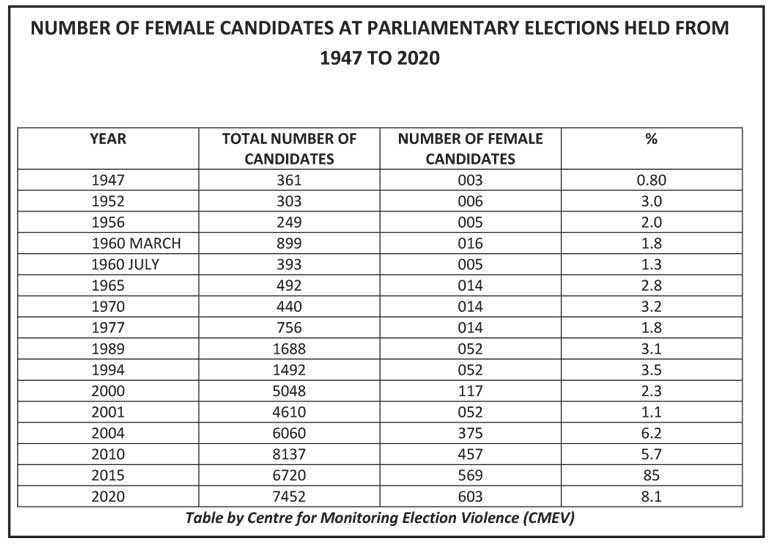Monday Feb 23, 2026
Monday Feb 23, 2026
Tuesday, 29 December 2020 00:00 - - {{hitsCtrl.values.hits}}
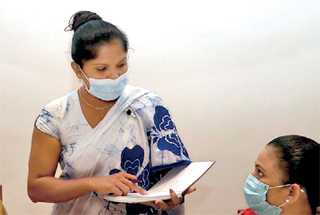
Dilini Kusum Pemadasa
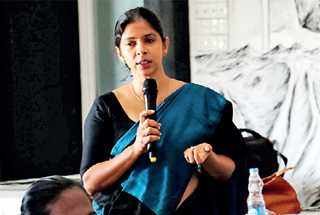
Gayani Premathilake
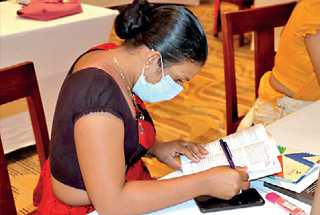
W. M. Supini Sandamali
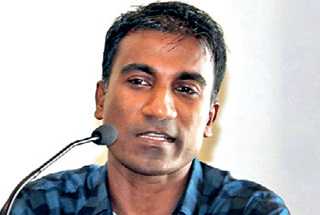
Manjula Gajanayake
Text and pix by P.D de Silva
Sharing her views at a dialogue conducted for female political activists in the North Central Province recently, Councillor of the Anuradhapura Municipal Council W.M. Supini Sandamali said the she would rather take up the challenge of securing sufficient votes and get elected rather than be elected on the quota system. She called upon the law makers to scrap the quota system for female representation and political parties to nominate more female candidates for future elections
Supini a nominee of the Sri Lanka Podujana Peramuna (SLPP) was elected to the Anuradhapura Municipal Council at the local government election held in 2018. Two years earlier, Parliament had passed the Local Authorities Elections (Amendment) Act, No. 1 of 2016 stipulating that 25% of the candidates at local elections are female.,
She said that her fellow male councillors are of the notion that politics was not for females. And that female councillors were propelled in to the council because of the quota system. “It is taboo for us to even speak at the council and are torn to shreds if we make a small mistake,” she added.
Supini was confident that she had not slacked in her responsibilities and duties to her family and society and said that she was ready to take up the challenge of contesting the forthcoming Provincial Council Election if given the opportunity.
Member of the Medawachchiya Pradeshiya Sabha Dilini Kusum Pemadasa said that only a handful of people encouraged her when she entered politics. She added that the only shortcoming female councillors faced was sufficient political exposure. She confided that she had been capable of managing her family as well as her political activities well.
Anuradhapura MC Councillor, Surangi Renuka Samarathunga said that her male counterparts always underestimated the abilities of female councillors. She said that there was much she had learnt about the political arena in the past two years and was ready to move on from the next level of governance.
In another such dialogue held in the Uva Province, Legal Officer, the Ministry of Public Service, Provincial Councils, and Local Government, Gayani Premathilake said that the mandatory women’s political representation in Sri Lanka did not receive the unanimous approval and blessings of everyone. She said that it was achieved after nine decades of struggle. Premathilake said that even today, there is a socio-political background in which even the slightest mistake of a female political representative makes is seen as a serious mistake. She added that it was encouraging to see how creatively female political activists use the political clout they have acquired. “It is imperative that female councillors or members of Pradeshiya Sabhas are well versed in the election and local government laws and existing procedures in the local government process.
National Coordinator of the Centre for Monitoring Election Violence (CMEV) Manjula Gajanayake said that even though the Article 12 (ii) of the Constitution of the Democratic Socialist Republic of Sri Lanka states that ‘No citizen shall be discriminated against on the grounds of race, religion, language, caste, sex, political opinion, place of birth or any one of such grounds’ and 12 (iii) No person shall, on the grounds of race, religion, language, caste, sex or any one of such grounds, be subject to any disability, liability, restriction or condition with regard to access to shops, public restaurants, hotels, places of public entertainment and places of public worship of his own religion Ensures citizens’ rights, it was evident that leaders of political parties had discriminated females by not giving them a fair opportunity to contest elections.
Gajanayake pointed out that the number of female candidates at any Parliamentary Election from 1947 to 2020 had not exceeded 9% of the total number of candidates in a country where the female population exceeded the male. He said that in 1947 there were only three female candidates among the 361 candidates that were nominated while in 2020 there were 603 females among the 7,452 candidates which was only 8.1%.
He said that the Local Authorities Elections (Amendment) Act, No. 1 of 2016 and Local Authorities Elections (Amendment) Act, No. 16 of 2017 were introduced to ensure that there was at least a 25% female representation in local government bodies while the Local Authorities Elections (Amendment) Act, No. 17 of 2017 ensured that 1/6th of the nomination at Provincial council elections should be females.
Gajanayake said that he had received information that the government was contemplating of repealing the above acts and reverting back to the old system. He said that if it does happen then the leaders of political parties should ensure the constitutional rights of females by providing them with the opportunity to vie for seats in local government bodies, provincial councils and parliament.
